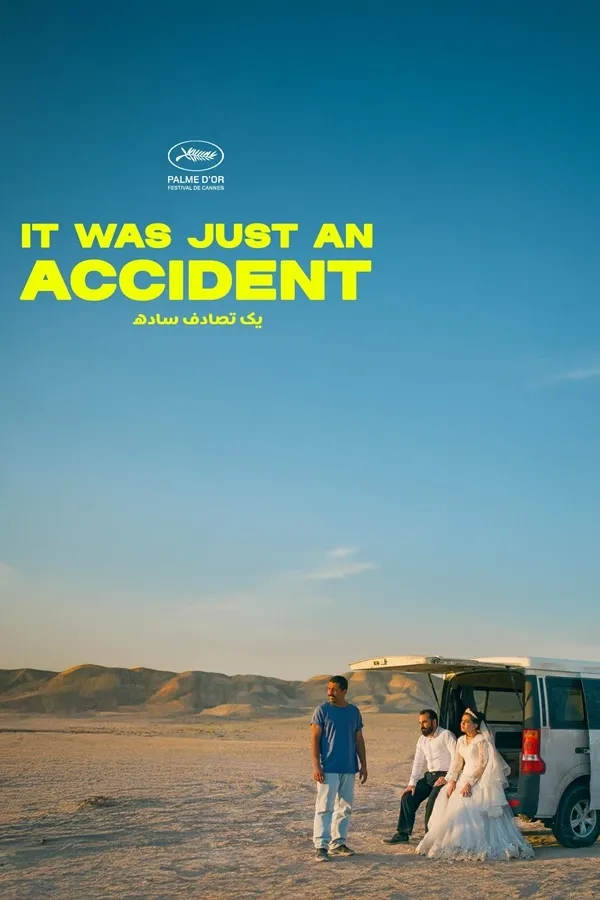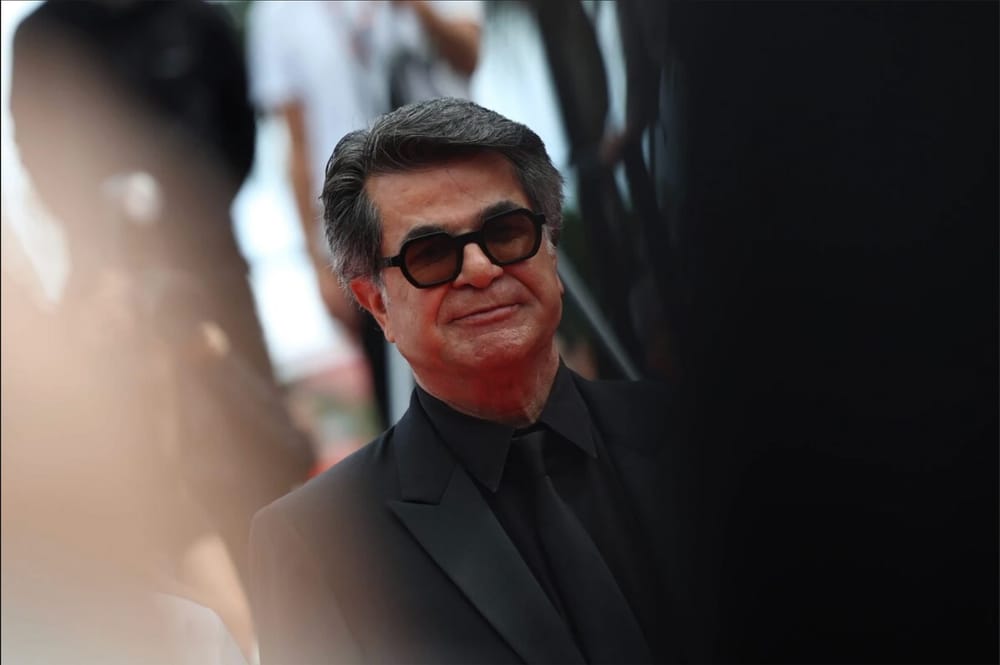One of the most powerful moments at this year’s Cannes Film Festival — and perhaps in its history — came when Iranian director Jafar Panahi learned he had won the Palme d’Or. As jury president Juliette Binoche announced his film, It Was Just an Accident, as the winner, the Lumière Theatre rose to its feet. All except for Panahi, who remained seated, dark glasses masking his eyes, momentarily stunned.
Then, suddenly, he flung his arms skyward.
The ovation was for the film – a spare, suspenseful parable – but also for Panahi himself, whose career has been defined by defiance. In 2010, after refusing to comply with government restrictions on his work, he was banned from filmmaking for 20 years and placed under house arrest. Panahi was also banned from travelling and from speaking to journalists. He responded with a series of clandestine, critically acclaimed films: This Is Not a Film, Closed Curtain, Taxi, No Bears. In 2022, he was jailed after protesting the imprisonment of fellow director Mohammad Rasoulof and released seven months later following a hunger strike. Soon after, he began work on It Was Just an Accident, shot in secret with cinematographer Amin Jafari and a small cast.
The film opens with a simple scene: a man, Eghbal, hits a dog while driving at night with his wife and young daughter. His wife insists it was “God’s will.” The daughter, unconvinced, tells Eghbal, “It was you. God had nothing to do with it.” The quiet reckoning deepens when Eghbal’s car breaks down and he encounters a mechanic, Vahid, who suspects — but cannot be sure — that Eghbal was the man who once blindfolded and interrogated him in prison. What unfolds is part thriller, part meditation on justice, memory, and complicity.
It Was Just an Accident received an eight-minute standing ovation at Cannes. When the applause subsided, Panahi addressed the audience: “Today, I’m here with you, I receive this joy, but… how can I rejoice? How can I be free while in Iran, there are still so many of the greatest directors and actresses of Iranian cinema, who, because they participated in and supported the demonstrators during the Femme Liberté [Woman Life Freedom] movement, are today prevented from working?”
That protest movement, which began in 2022 after the death of Mahsa Amini in police custody, saw women and girls lead nationwide demonstrations against Iran’s compulsory hijab laws and systemic repression. It has since become a cultural and political reckoning — one that directly informs It Was Just an Accident, Panahi’s first film in which women appear conspicuously without hijabs. This interview took place at Cannes, the morning after the film’s premiere.
It Was Just an Accident and the Jafar Panahi: Cinema in Rebellion retrospective are screening at the 2025 Sydney Film Festival. Visit SFF.org.au for tickets.
What is your current situation? How were you able to make this film and where are you based now? Can you travel?
Jafar Panahi: The 20-year work ban, and travel ban and so on, all those accusations and sentences have now been lifted. At the moment, I don't have problems travelling. I can speak to journalists for the first time, and I should not have any problems making more films. But of course, in Iran, if you make a film out in the open, you need filming permits, which means you need to submit your script to the Ministry of Islamic of Culture and Islamic Guidance. They read the script and tell you whether they'll grant you a permit or not. They might also give you very specific feedback, and you must honour their wishes. Of course, I wasn't ready to let them read the script and tell me what to make. So just like before, I had to go back to underground filmmaking and create what I wanted in secret, very quickly and with a very small cast and crew.
What does that mean to the crew and the cast? Could they be in trouble because of the film?
JP: Before coming here to Cannes, three of my actors were summoned for interrogations and people were threatened. Same goes for my cinematographer, but nonetheless, they've all come here with me, and we'll go back to Iran and then we'll see what happens. We can't predict what will happen next.
How did your time in prison inform the film?
JP: It Was Just an Accident doesn't only recount my own experience, but rather the experience of all prisoners. A little part of the film is really my own story, but most of it has to do with stories I heard whilst in prison, condensing what's happened over the last half century. The Islamic Republic can now be divided into two periods, pre-Woman Life Freedom and post-Women Life Freedom. Because after this movement, or revolution, so many things have changed. People have become much more courageous, have much greater demands. We can really say that this government, this system, has collapsed from any point of view you can imagine. Politically, culturally, economically, environmentally. Only this superficial, empty structure remains in place, and it is governing the country through money and violence.
Many of the actors in the film are not professional actors. How did you find them?

JP: Some of them are non-actors. Others have previously acted in films, both my own films and other people's films. For instance, the actor who plays Eghbal, the interrogator, has acted in some underground films. The actor who plays Vahid, the main character, acted in one of my films before and he also played the protagonist in the film by a friend. He also acts in low-quality TV comedies. But the two female characters had never acted on screen before. The actress who plays Shiva, the photographer, was the assistant director on a shoot. The actress who plays the bride had recently started working as a stage actress. I don't have a very good relationship with theatre. It feels fake to me. It can't quite grab my attention. Once in a while I do go watch a play when my friends keep insisting but, I really can't stand it. So, I had to go and watch this play that this actress, Hadis Pakbaten, happened to be in. And it included both a stage reading and scenes in which people were acting. Hadis was standing in a corner simply reading out a text. So, I didn't watch the play, I watched her, and that's where I chose her. She was quite surprised. She told me, ‘But I wasn't acting. How did you choose me?’ I said, ‘I chose you exactly because you were not acting. Had you been acting, I would never have chosen you’.
The film begins with an accident and then turns into something more personal and political. When you are making a film, do you view accidents as having a deeper, more spiritual meaning?
JP: Accidents are accidents, of course. I put the accident in on purpose, to open up a number of issues. First of all, the young daughter is a symbol of the new generation that comes out of the heart of darkness. She is in the car, full of life, dancing and singing. In her own way, she really questions the core of the ideology of the family. When the mother, referring to the killing of the dog, not God, says that this was God's will, the daughter, with a very few words, really strikes at the heart of that ideology, saying, it was you who weren't careful. What does this have to do with God? So, I put in, if you like, this dramatic form, this tool, to exploit it dramaturgically. And then, of course, the entire film has to do with this ideological discussion. This ideology which has brought about so many restrictions and that enables all sorts of violence and that questions people's belief, it interferes with everything, from the way you talk to how you dress to how you eat, everything.
Mohammad Rasoulof has left Iran and moved to Germany where he plans to make more films. Before coming to Cannes, you said you will go back to Iran. Could you make movies elsewhere? Why do you want to stay in Iran?
JP: I'm not in Iran only to make films. Some of my friends possess the ability to accord themselves with living outside of Iran, even for many years. And I don't want to judge, I don't want to say if it's a good thing or a bad thing. All I know is that I have neither the capacity nor the courage to accord myself with any place in the world other than Iran. I came to France to complete the post production of the film for three months and it was awful. I was really fretting to leave, to go back to Iran as soon as possible. I cannot imagine what would happen if I were to come and live here one or two years. I don't know. All I can say is that this is how I feel at the moment. Maybe one day things will change.
Some people have seen the film as a morality play about the aftermath of state violence. This is a subject you can relate to personally, but do you feel that the responses available to someone who has experienced state violence are also choices that Iranian society faces?
JP: Indeed. But I think the main issue of the film is what is the future going to be like? What future are we looking at? Will this violence just keep going on, or does it have to finally stop somewhere? Of course, change needs to take place, whether it comes from growing awareness or from forgiveness, that's all to be seen.
Iran has changed a great deal over the last decade. How would this film be different if you had made it five or ten years ago?
JP: Everything has changed since the Woman Life Freedom movement. My previous films, as you know, are all set in society, in public spaces, in the streets and markets inhabited by everyday people. Because of that, I got all sorts of problems, imprisonment and so on. In prison, who do I see? Who do I get to know? Who do I hang out with? Who do I talk to? Five or ten years ago, I could not have found these people in the streets. But because of my experiences, I actually happened to encounter them in prison. It has so much to do with the experience in the sense that 10, 12 years ago, when I spent time in prison, a part of that was in solitary confinement. And then I was in a part of the prison with only two or three other prisoners. Whereas this time around, I spent time in a section of prison that had between 300 to 400 inmates, 30 of whom were political prisoners. Ten years ago, the government had much stricter control and it would have been much more dangerous. But now, of course, everything is different.
From outside Iran, you’re often seen as courageous. When you know that you will be making a film that will be banned, how do you decide what will be included in that story?
JP: I'm very sensitive about the use of these words, ‘courage’ and ‘courageous’, because I don't believe I have any more courage – and perhaps even less – than the extraordinary women who time and again come out with no headscarf, get harassed, get hit, get arrested, and do it again the day after. They are not in the public eye, whereas I am. So, of course, everything I do gets seen and gets appreciated, but they are in much greater danger than I am.
Screening or Streaming Availability:

